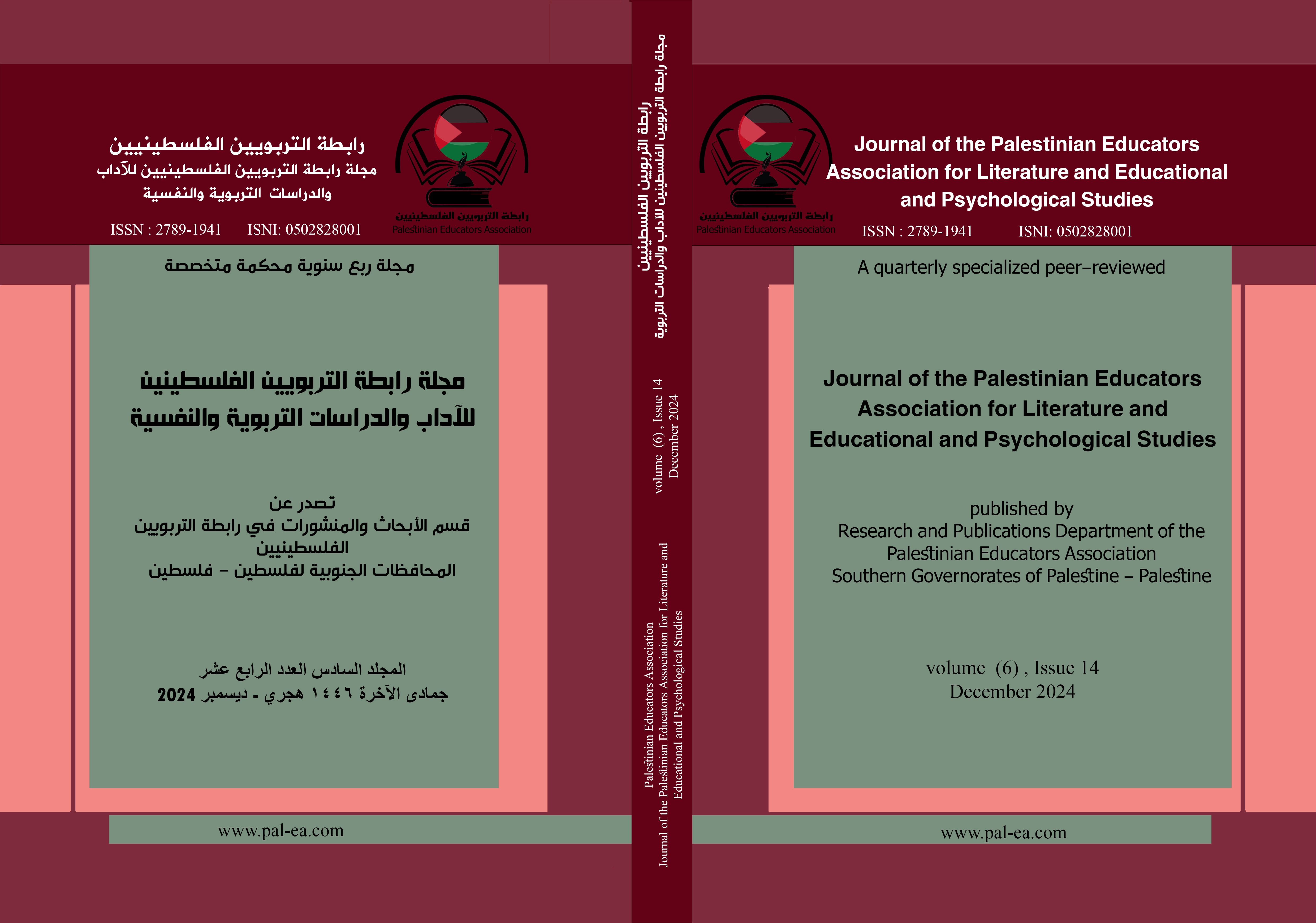دور الأقران في تعزيز الصلابة النفسية لدى آباء وأمهات ذوي الاحتياجات الخاصة
الكلمات المفتاحية:
الاقران، الآباء والأمهات، ذوي الاحتياجات الخاصة، الصلابة النفسيةالملخص
هذه الدراسة النوعية تبحث في دور دعم الأقران في تعزيز الصلابة النفسية لدى الآباء والأمهات الذين لديهم أطفال من ذوي الاحتياجات الخاصة. وتكشف عن أن دعم الأقران يعزز أبعاد الصلابة النفسية المتمثلة في الالتزام والسيطرة والتحدي. يواجه المشاركون في الدراسة ضغوطًا وتحديات كبيرة في تربية أطفالهم، بما في ذلك التنقل في أنظمة الرعاية الصحية والتعليمية المعقدة، وإدارة الأعباء المالية، والتعامل مع التأثير العاطفي لرعاية الطفل.
تؤكد نتائج الدراسة على الدور المهم لدعم الأقران في تعزيز الصلابة النفسية للآباء والأمهات. حيث يوفر هذا الدعم العاطفي والتأييد والشعور بالانتماء إلى مجتمع. كما أن تبادل المعلومات والموارد العملية بين الأقران يعزز الشعور بالسيطرة والوكالة الشخصية. علاوة على ذلك، فإن مشاركة استراتيجيات التأقلم وقصص الصلابة مع أقرانهم تساعدهم على إعادة صياغة تحدياتهم كفرص للنمو والتعلم.
تساهم نتائج الدراسة في فهم أعمق لآليات تعزيز الصلابة النفسية لدى هذه الفئة. ويمكن أن توجه النتائج تصميم وتنفيذ التدخلات والمبادرات التي تستخدم قوة دعم الأقران لتعزيز الصلابة والرفاهية لدى الآباء والأمهات الذين لديهم أطفال من ذوي الاحتياجات الخاصة.
التنزيلات
المراجع
Benson, P. R. (2016). The impact of child symptom severity on depressed mood among parents of children with ASD: The mediating role of stress proliferation. Journal of Autism and Developmental Disorders, 46(6), 2111-2121.
Braun, V., & Clarke, V. (2006). Using thematic analysis in psychology. Qualitative research in psychology, 3(2), 77-101.
Buheji M &Jahrami H 2020 Analysing Hardiness Resilience in COVID-19 Pandemic - Using Factor Analysis. International Journal of Management ,11 (10): 802-815.
Burton, R. S., Zwahr-Castro, J., Magrane, C. L., Hernandez, H., Farley, L. G., & Amodei, N. (2018). The nurturing program: An intervention for parents of children with special needs. Journal of child and family studies, 27, 1137-1149.
Cantwell, J., Muldoon, O. T., & Gallagher, S. (2015). The influence of self-esteem and social support on the relationship between stigma and depressive symptomology in parents caring for children with intellectual disabilities. Journal of Intellectual Disability Research, 59(10), 948-957.
Cantwell, J., Muldoon, O. T., & Gallagher, S. (2015). The influence of self-esteem and social support on the relationship between stigma and depressive symptomology in parents caring for children with intellectual disabilities. Journal of Intellectual Disability Research, 59(10), 948-957.
Creswell, J. W., & Poth, C. N. (2016). Qualitative inquiry and research design: Choosing among five approaches. Sage publications.
Desiningrum, D. R., & Kurniawati, K. (2023, October). Parenting Self-Efficacy, Hardiness and Psychological Well-Being of Parents of Children with ASD. In Proceedings of International Conference on Psychological Studies (ICPsyche) (Vol. 4, pp. 328-340).
Dunst, C. J. (2021). Family hardiness and parent and family functioning in households with children experiencing adverse life conditions: a meta-analysis. International Journal of Psychological Research, 14(2), 93-118.
Fitriani, A., & Ambarini, T. K. (2013). Hubungan antara hardiness dengan tingkat stres pengasuhan pada ibu dengan anak autis. Jurnal Psikologi Klinis dan Kesehatan Mental, 2(2), 34-40.
Hayes, S. A., & Watson, S. L. (2013). The impact of parenting stress: A meta-analysis of studies comparing the experience of parenting stress in parents of children with and without autism spectrum disorder. Journal of autism and developmental disorders, 43, 629-642.
Hystad, S. W. (2012). Exploring gender equivalence and bias in a measure of psychological hardiness. International Journal of Psychological Studies, 4(4): 69
Kobasa, S. C. (1979). Stressful life events, personality, and health: An inquiry into hardiness. Journal of Personality and Social Psychology, 37(1), 1-11.
Maddi, S. R. (2006). Hardiness: The courage to grow from stresses. The journal of positive psychology, 1(3), 160-168.
Maddi, S. R., Harvey, R. H., Khoshaba, D. M., Lu, J. L., Persico, M., & Brow, M. (2006). The personality construct of hardiness, III: Relationships with repression, innovativeness, authoritarianism, and performance. Journal of personality, 74(2), 575-598.
Mund, P. (2021). Culture and resilience at work: A study of stress and hardiness among Indian corporate professionals. Routledge.
Peer, J. W., & Hillman, S. B. (2014). Stress and resilience for parents of children with intellectual and developmental disabilities: A review of key factors and recommendations for practitioners. Journal of Policy and Practice in Intellectual Disabilities, 11(2), 92-98.
Shapiro, C. J., Kilburn, J., & Hardin, J. W. (2014). Prevention of behavior problems in a selected population: Stepping stones triple P for parents of young children with disabilities. Research in Developmental Disabilities, 35(11), 2958–2975. https://doi.org/10.1016/j.ridd.2014.07.036.
Weiss, M. J. (2002). Hardiness and social support as predictors of stress in mothers of typical children, children with autism, and children with mental retardation. Autism, 6(1), 115-130.
Woodman, A. C., & Hauser-Cram, P. (2013). The role of coping strategies in predicting change in parenting efficacy and depressive symptoms among mothers of adolescents with developmental disabilities. Journal of Intellectual Disability Research, 57(6), 513-530.
Woodson, K. D., Thakkar, S., Burbage, M., Kichler, J., & Nabors, L. (2015). Children with chronic illnesses: factors influencing family hardiness. Issues in Comprehensive Pediatric Nursing, 38(1), 57-69.
منشور
إصدار
القسم
الرخصة
الحقوق الفكرية (c) 2024 أحمد إبراهيم منصور، ميلود عمار (مؤلف)

هذا العمل مرخص بموجب Creative Commons Attribution-NonCommercial-ShareAlike 4.0 International License.
مجلة رابطة التربويين الفلسطينيين للآداب والدراسات التربوية والنفسية
الرقم الإلكتروني: 1941-2789
احتفاظ المؤلفين بحقوق الطبع والنشر
تسمح مجلة رابطة التربويين الفلسطينيين للآداب والدراسات التربوية والنفسية للمؤلفين بالاحتفاظ بحقوق الطبع والنشر ومنح المجلة حق النشر الأول مع العمل المرخص في نفس الوقت بموجب ترخيص Creative Commons Attribution (CC-BY) 4.0 الذي يسمح للآخرين بمشاركة العمل مع الاعتراف بتأليف العمل ونشره الأولي في هذه المجلة.
بشرط أن يكونوا أصحاب حقوق الطبع والنشر لعملهم، يستطيع المؤلفون الدخول في ترتيبات تعاقدية منفصلة وإضافية للتوزيع غير الحصري للنسخة المنشورة من العمل في المجلة (على سبيل المثال، نشرها في مستودع مؤسسي، في مجلة) أو نشره في كتاب) مع شكر على نشره الأولي في هذه المجلة.
يُسمح للمؤلفين ويتم تشجيعهم على نشر أعمالهم عبر الإنترنت (على سبيل المثال، في المستودعات المؤسسية، أو المستودعات الصارمة، أو على موقع الويب الخاص بهم) قبل وأثناء عملية التقديم.










